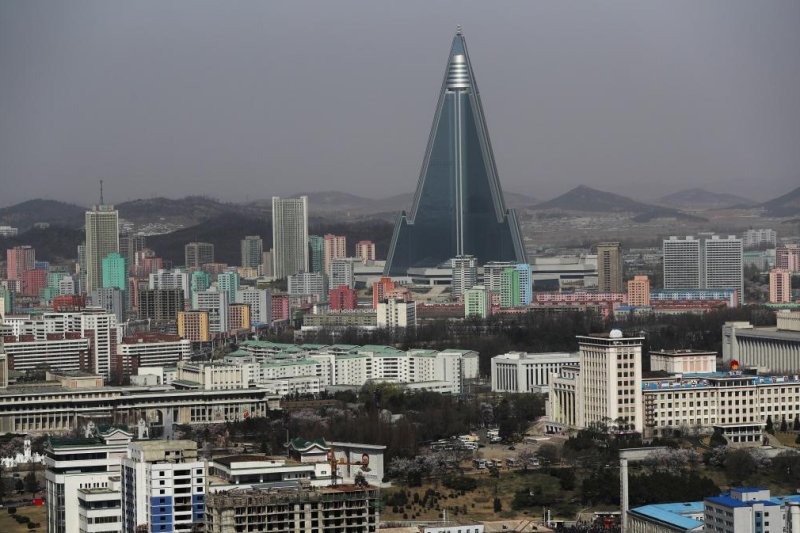A general view of Pyongyang with the Ryugyong Hotel at the background in the capital of North Korea. File Photo by How Hwee Young/EPA
SEOUL, Nov. 30 (UPI) -- A South Korean think tank has launched a project to study major cities in North Korea in preparation for increasing inter-Korean exchanges and joint projects along with diplomatic efforts to improve ties.
Seoul-based Korea Institute for National Unification said it will study 27 North Korean cities, including the capital city of Pyongyang, Wonsan, Sinuiju, Cheongjin and Hamheung, for the next five years.
It will collect information on various aspects of the cities and build an open database for South Korean policymakers, researchers and citizens to help them facilitate exchanges with North Korean people.
"We need a comprehensive understanding in North Korean cities from its physical structure, transportation and infrastructure to history, culture and arts. This project will require varied perspectives and concerted efforts," Seoul Mayor Park Won-soon said at the project launch on Thursday.
The need to investigate North Korean cities emerged when the KINU, specializing in North Korean studies, learned that many cities have undergone major transformations since Kim Jong Un took over the leadership from his father in 2012.
"This happened when Kim was pushing for nuclear and missile development. Despite intensifying international sanctions, he pushed ahead various city development projects," said Hong Min, a research fellow of the institute's North Korea Research Division.
North Korean leadership and city projects
A series of construction projects took place when the United Nations and the United States imposed heavy sanctions on North Korea to ban trades of petroleum products, coal and luxury goods, among others, to pressure the isolated regime to give up its nuclear weapons.
North Korea, on the other hand, designated special districts and built high-rise buildings, apartment complexes, and shopping malls. It also made a new international terminal at Pyongyang International Airport in 2015.
Experts say Kim pursued the development projects to consolidate his leadership despite economic difficulties.
"It's a tactic the young leader used to overcome his lack of leadership experience," Hong said. Kim, the youngest son of former North Korean leader Kim Jong Il, was reportedly born in 1983 or 1984.
North Korea's state-led construction projects portray the power of the leadership and big cities have shown rapid transformations as Kim wanted to solidify his leadership in a short period of time, said Zheng Jiyong, a professor at Fudan University.
The state newspaper Rodong Shinmun has published propaganda images of Kim Jong Un, inspecting construction sites in the affluent Ryeomyeong District, home of high-rise apartments and shopping malls, and Mirae Scientists Street, which houses scientific institutions, in Pyongyang.
Masterminds of city plans
North Korean leaders have pursued their own construction projects in ways that suit their preference.
Ahn Byung-min, a senior research fellow of the Korea Transport Institute, said the founding leader of North Korea, Kim Il Sung, banned trucks on the streets of Pyongyang as he thought they ruin the city landscape.
In 2009, Kim Jong Il ordered the demolition of one of the biggest markets in Pyongsong, northeast of Pyongyang, because it was too crowded. Then he made a base that would control marketization of North Korean cities.
Zheng, who studied at Kim Il Sung University and has visited North Korea numerous times, said North Korea's city development projects focus more on speed and aesthetics than functionality.
North Korea set an ambitious deadline to complete the Ryeomyeong District development project by the end of 2016, just eight months after it announced the beginning of the construction.
North Korea's state media, Korean Central News Agency, reported extensively on construction processes. According to South Korean broadcast channel KBS, the KCNA reported that North Korean workers finished a high-rise building in 74 days at a speed of raising one level every 18 hours.
The emphasis on speed rather than quality resulted in building collapses.
A 23-story apartment collapsed, causing dozens of deaths in Pyongyang in 2014, according to KBS. Another collapse killed 60 workers and injured more than a hundred in a construction site of Ryeomyeong District in Pyongyang in 2016.















